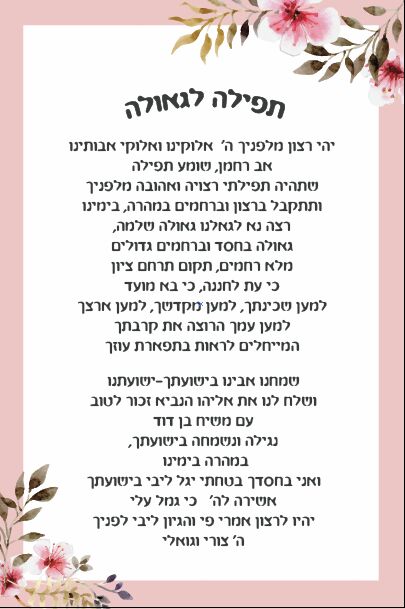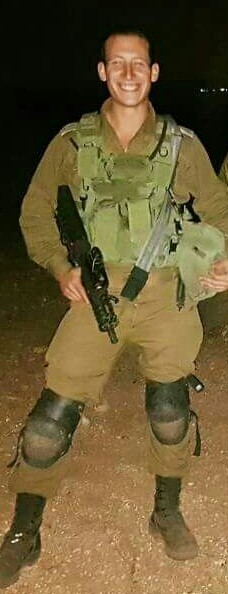Esti Goloventzitz: "Why Was I Chosen to Be a Mother for 22 Years?"
Esti Goloventzitz, who never considered herself an initiator, launched a remarkable prayer day for women in memory of her late son David, to implore for redemption.
 David Goloventzitz z"l and his mother Esti Goloventzitz
David Goloventzitz z"l and his mother Esti GoloventzitzThe 11th of Tammuz 5777 was a devastating day for the Goloventzitz family in Efrat. Their son, David, an officer serving in the Samaria region, died in a tragic shooting accident, and the heavy loss struck them like a bolt from the blue.
"After David's passing, I was in a very difficult mental state," shares Esti Goloventzitz, his mother. "I tried to understand why it happened and why I was chosen to be a mother for only twenty-two years. Then, three weeks after his passing, I heard a special talk from Rabbi Dov Zinger of Yeshivat Makor Chaim about the pain of the Shechina. Rabbi Zinger spoke about how the deep meaning of great sorrow is actually sharing. By causing a person to experience the greatest pain that a parent can go through, Hashem is effectively sharing with them the pain of the Shechina, the pain of exile. His words entered my heart very strongly. Suddenly, amidst my sorrow, I began to understand the grief of the Master of the World."
What does that do for you? Surely, it only deepens the sadness...
"On the surface, it certainly adds to my personal sorrow. But that's only superficially, because Rav Nachman has already explained at length that a person who experiences sorrow should rejoice that they were chosen by Hashem to become a partner. So no, I'm not yet at such a level of joy. I'm not at a place where I can say thank you for such a disaster. But Rabbi Zinger's words did not leave me; they simply would not go away. Gradually, I began to understand that I had to take the tragedy I experienced and leverage it, to make construction from destruction. The problem was, I didn't know how to do it."
 Women's prayer for complete redemption
Women's prayer for complete redemptionThe Idea: A Day of Prayer
Esti also mentions that after her son's passing, she happened upon a book of letters written by the Lubavitcher Rebbe to bereaved families. "The book is very moving, but two things in particular touched me. One was how the Rebbe wrote about how much we need to focus on life and build it. To continue living with joy and know that the deceased wants to see us happy and this brings them joy as well. The second thing was to accept the suffering with love, but at the same time 'demand' from Hashem to bring redemption and actually say to Him: 'We will not let You go until You redeem us.'"
According to her, as a result of all these things, she began to reflect on how there are so many mothers in the Jewish People going through various trials. And particularly these mothers, and women in general, have such great power. "At that moment, for the first time, the idea struck me to organize a day of prayer where we would transform our pain into prayer, asking Hashem to say enough to our troubles," she explains. "The idea slowly developed and took shape. I shared it with anyone who would listen, and Hashem sent me the right messengers to bring it to fruition – Rabbi Shmuel Eliyahu, Rabbi Shlomo Katz, and also Rebbetzin Yemima who participated in the event."
Were you always the initiating and organizing type?
Esti smiles. "Honestly, absolutely not. I never initiated or organized anything before, but here I felt that my son David was giving me his strength, because he was the complete opposite of me. He was energetic and proactive, with a strong sense of justice, and when something needed to change, he pursued it with the utmost strength. After this entire event, I feel it was a joint project of Hashem, David, and myself."

May Hashem say enough to our troubles
Last Thursday, in the afternoon, the special prayer took place on the Mount of Olives. "It's hard for me to describe the thrilling and chilling emotion we felt standing there – such a huge group of women, praying and beseeching. We truly felt the Shechina. It was something so powerful and intense, we genuinely felt we were being granted special Heavenly assistance to change reality. Rabbi Eliyahu was with us and delivered very moving remarks. He brought us into the Holy of Holies, helping us imagine and understand where we stood. Then came Rabbi Katz who spoke about prayer, and the aspiration to return the Kohanim to their service and the Levites to their songs and music. Finally, I also spoke and shared with the women what I felt. I quoted the Midrash from the book 'Mei Hashiloach' which says that out of Hashem's love for Israel, He sends them a great outcry before salvation, so that a person will thirst for salvation. This is seen with Yosef HaTzadik, who for all twelve years in prison slept well at night because he was on a high level of faith, happy with his lot, and did not complain. But on the night before salvation, he cried the whole night – how long would he endure this pain? And he prayed. This shows that intentionally, Hashem sends out a cry before salvation.
"I continued and told the dear women that it's not because we pray that Hashem saves us, but Hashem already wants to save us, yet He wants us to merit being partners in it. Therefore, He makes us plead and ask, thus awakening us. We then recited specific chapters of Tehillim, sang An'im Zemirot and other parts of the small Yom Kippur service, as it was the eve of Rosh Chodesh Nissan. We deliberately chose this special date to hold the day of prayer. For it is written that the month of Nissan is the month of redemption, and it is known that the righteous women brought redemption to Am Yisrael. My feeling is that we can fully do this again."
Can we ask when there will be another prayer like this?
"With the help of Hashem, there won’t be. After all, we believe in the coming of Mashiach every day. But until that happens, I think each of us should strive to continue this enormous effort on a smaller scale. After all, in every prayer and every Birkat Hamazon we request the rebuilding of Jerusalem. How much do we truly engage in this reality of rebuilding Jerusalem? Unfortunately, and I include myself, most of us do not focus enough on this. So perhaps this is the small thing we will take upon ourselves. We should strive to pray and yearn for the redemption, so that one day, when Mashiach arrives, it doesn’t surprise us, rather we will truly anticipate it."

